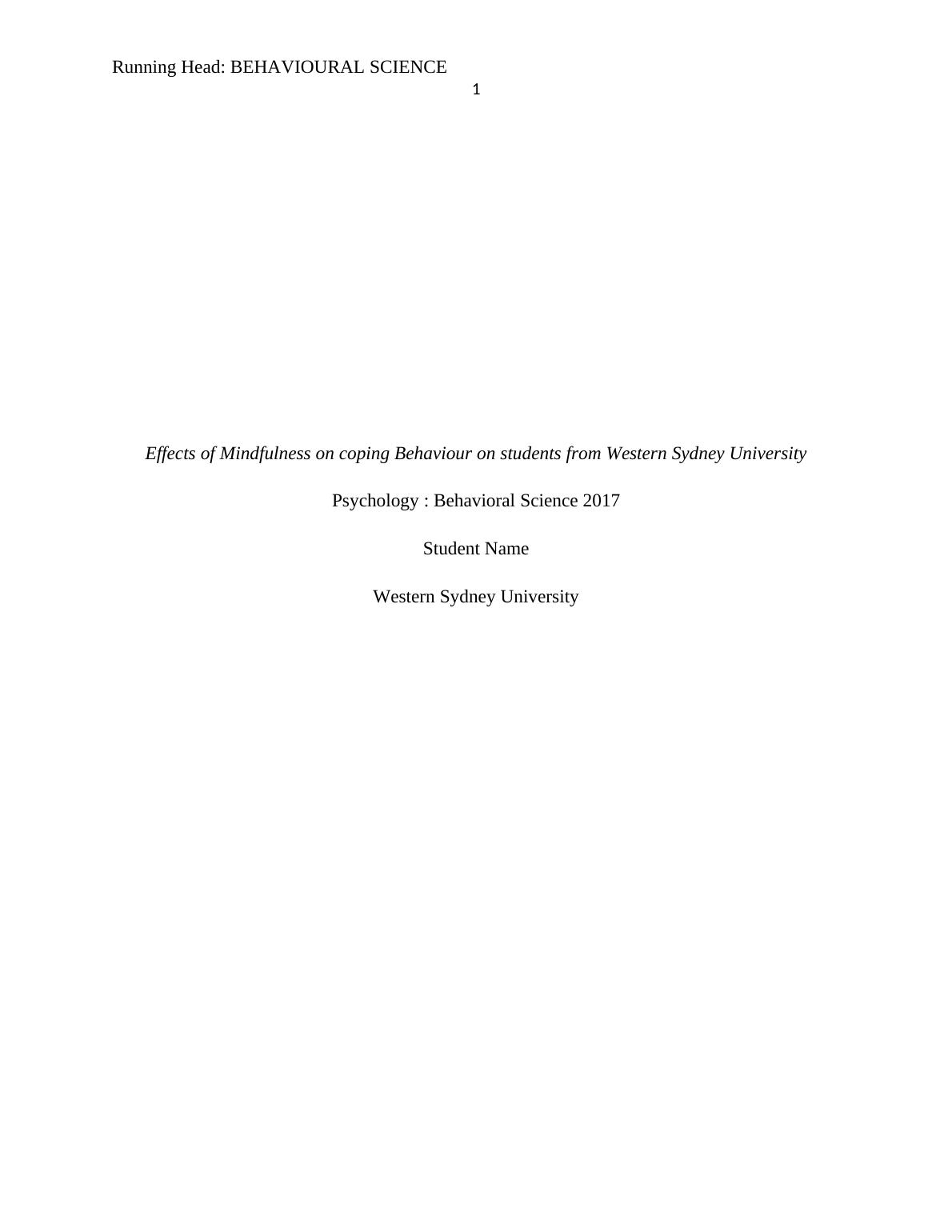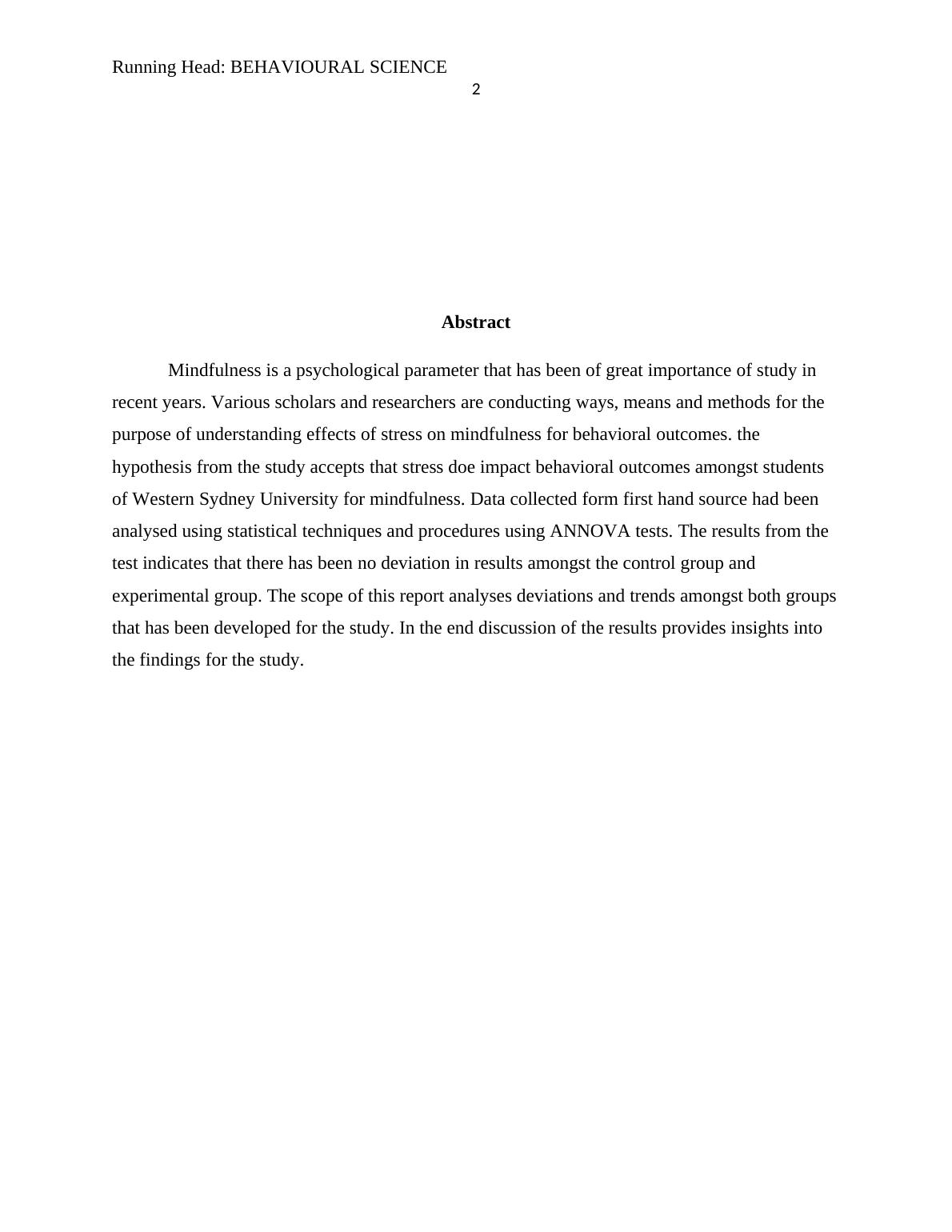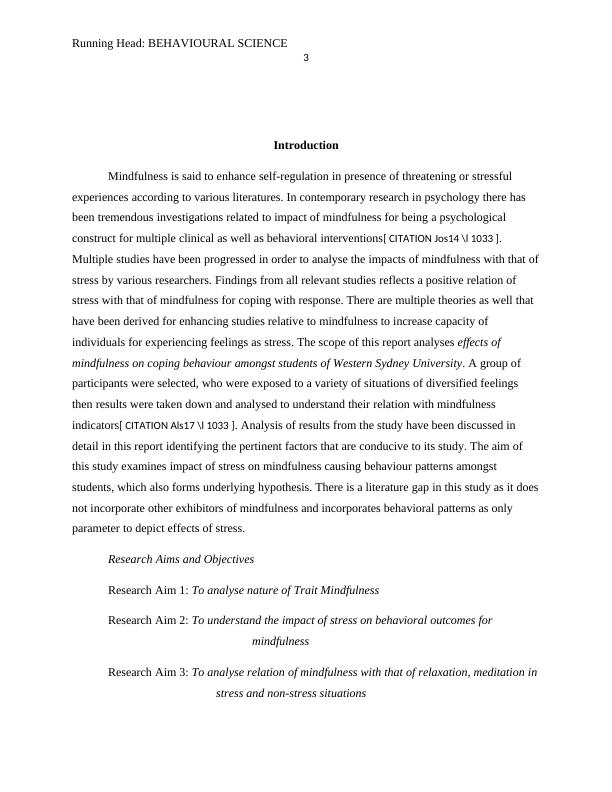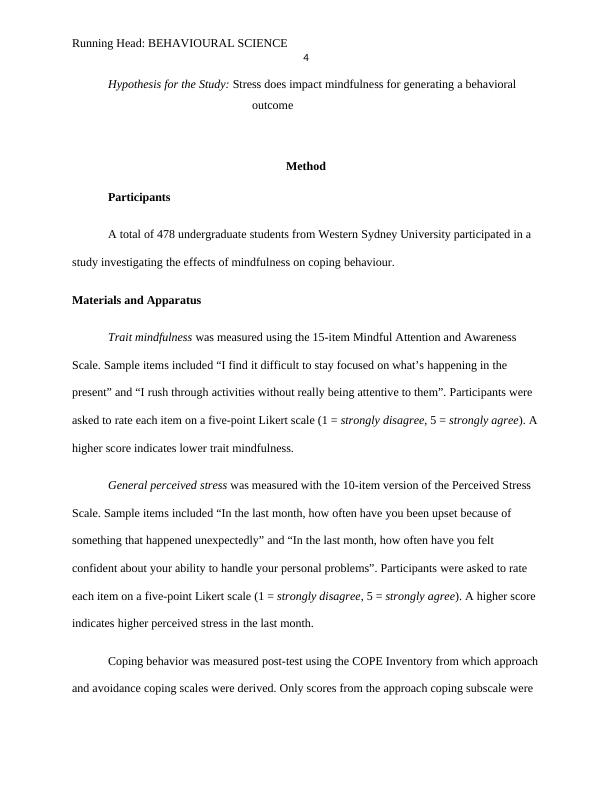Report on Behavioural Science
Added on 2020-04-07
11 Pages2857 Words77 Views
Running Head: BEHAVIOURAL SCIENCE1Effects of Mindfulness on coping Behaviour on students from Western Sydney UniversityPsychology : Behavioral Science 2017Student NameWestern Sydney University

Running Head: BEHAVIOURAL SCIENCE2AbstractMindfulness is a psychological parameter that has been of great importance of study in recent years. Various scholars and researchers are conducting ways, means and methods for the purpose of understanding effects of stress on mindfulness for behavioral outcomes. the hypothesis from the study accepts that stress doe impact behavioral outcomes amongst students of Western Sydney University for mindfulness. Data collected form first hand source had been analysed using statistical techniques and procedures using ANNOVA tests. The results from the test indicates that there has been no deviation in results amongst the control group and experimental group. The scope of this report analyses deviations and trends amongst both groupsthat has been developed for the study. In the end discussion of the results provides insights into the findings for the study.

Running Head: BEHAVIOURAL SCIENCE3Introduction Mindfulness is said to enhance self-regulation in presence of threatening or stressful experiences according to various literatures. In contemporary research in psychology there has been tremendous investigations related to impact of mindfulness for being a psychological construct for multiple clinical as well as behavioral interventions[ CITATION Jos14 \l 1033 ]. Multiple studies have been progressed in order to analyse the impacts of mindfulness with that ofstress by various researchers. Findings from all relevant studies reflects a positive relation of stress with that of mindfulness for coping with response. There are multiple theories as well that have been derived for enhancing studies relative to mindfulness to increase capacity of individuals for experiencing feelings as stress. The scope of this report analyses effects of mindfulness on coping behaviour amongst students of Western Sydney University. A group of participants were selected, who were exposed to a variety of situations of diversified feelings then results were taken down and analysed to understand their relation with mindfulness indicators[ CITATION Als17 \l 1033 ]. Analysis of results from the study have been discussed in detail in this report identifying the pertinent factors that are conducive to its study. The aim of this study examines impact of stress on mindfulness causing behaviour patterns amongst students, which also forms underlying hypothesis. There is a literature gap in this study as it doesnot incorporate other exhibitors of mindfulness and incorporates behavioral patterns as only parameter to depict effects of stress. Research Aims and ObjectivesResearch Aim 1:To analyse nature of Trait MindfulnessResearch Aim 2: To understand the impact of stress on behavioral outcomes for mindfulness Research Aim 3: To analyse relation of mindfulness with that of relaxation, meditation instress and non-stress situations

Running Head: BEHAVIOURAL SCIENCE4Hypothesis for the Study: Stress does impact mindfulness for generating a behavioral outcomeMethodParticipantsA total of 478 undergraduate students from Western Sydney University participated in a study investigating the effects of mindfulness on coping behaviour. Materials and ApparatusTrait mindfulness was measured using the 15-item Mindful Attention and Awareness Scale. Sample items included “I find it difficult to stay focused on what’s happening in the present” and “I rush through activities without really being attentive to them”. Participants were asked to rate each item on a five-point Likert scale (1 = strongly disagree, 5 = strongly agree). Ahigher score indicates lower trait mindfulness. General perceived stress was measured with the 10-item version of the Perceived Stress Scale. Sample items included “In the last month, how often have you been upset because of something that happened unexpectedly” and “In the last month, how often have you felt confident about your ability to handle your personal problems”. Participants were asked to rate each item on a five-point Likert scale (1 = strongly disagree, 5 = strongly agree). A higher score indicates higher perceived stress in the last month.Coping behavior was measured post-test using the COPE Inventory from which approachand avoidance coping scales were derived. Only scores from the approach coping subscale were

End of preview
Want to access all the pages? Upload your documents or become a member.
Related Documents
The impact of mindfulness on coping behavior John S Smith Western Sydney Universitylg...
|12
|2757
|308
Consumer Psychology Case Study 2022lg...
|19
|3964
|46
RCT; A Mindfulness-Oriented Stress Management Program for Medical Studentslg...
|7
|1937
|315
Understanding the Impacts of Commuting on Students of WSU Collegelg...
|11
|1531
|223
Mindfulness: An Effective Vehiclelg...
|6
|1247
|32
Psychology | Assignment | Answerslg...
|6
|840
|18
